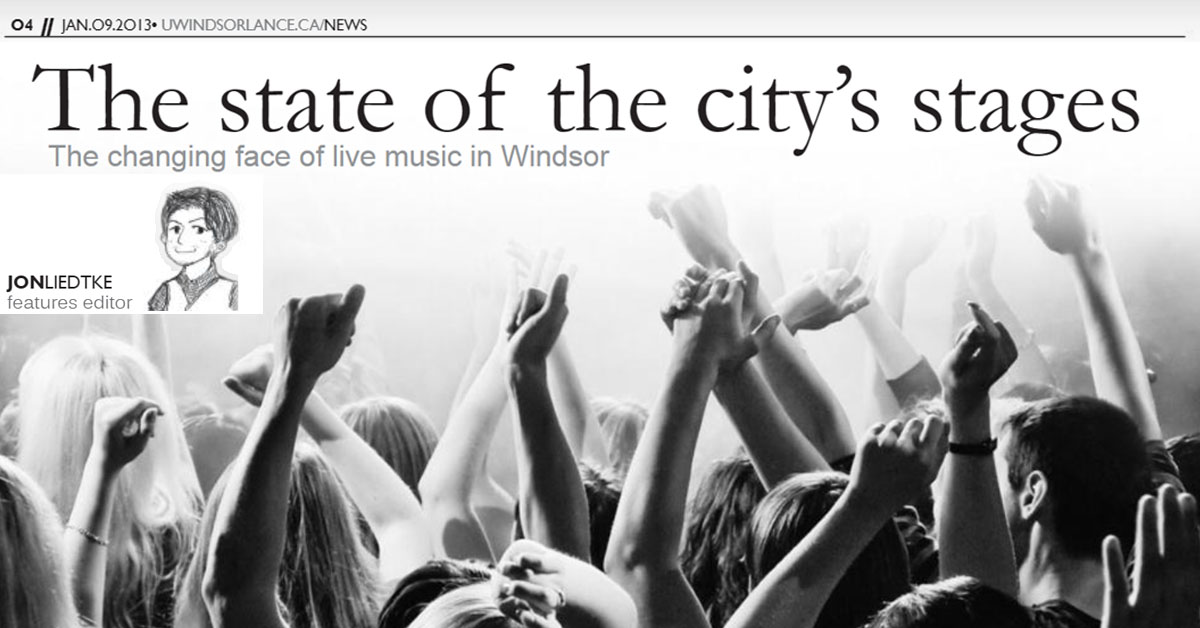UWindsor Lance
Issue 26, Volume 85
Jan. 9, 2013
Jon Liedtke
The Changing Face of Live Music in Windsor
There’s no doubt that Windsor has a well-established community of musicians who perform live in venues throughout the city on a regular basis. While established middle-aged rock and rollers perform alongside punk rock acts, it is also common to see folk acts and indie acts performing across town.
The Windsor music community is ever expanding, dating back to the turn of the 20th century with fixture locations where musicians performed. Leading up to and post-prohibition, the 1930s saw Windsorites flocking to the Tivoli and Elmwood theatre’s, respectively.
It was from these raucous times that Windsor established itself as a city of live music. The rowdiness and illegality of prohibition led way to the birth of the baby boomers and their insatiable appetite for live music.
Just across the river as Motown blossomed into the jewel of the North American music industry, Windsor too tagged along for the ride. The majority of the big acts which either emerged or toured through Detroit would cross the river to Windsor and perform at establishments across town.
As the years went by, Windsor musicians and international acts alike regularly performed across the city, and in tum, this gave way to creating an environment which helped to foster immense local talent.
“I think Windsor has a ton of local talent, from a lone acoustic act to cover bands to great home grown talent,” said Kristian Neill, owner of The Dominion House. “When Windsor comes out to support they come in large groups. Unfortunately, in our experience, a ticket price over $10 is met with resistance so bringing outside acts provides a challenge.”
“There’s plenty of local talent,” said Tarek Jafar, guitar player and vocalist of the Windsor blues duo The Blue Stones. “There’s bands that we play with all the
time that [I say], ‘You guys are really good.”
CJAM music director Murad Erzinclioglu, who is also the promoter of Harvesting the FAM arts festival, said Windsor is an accessible community. “Accessibility and willingness to fry something new is the main defining feature that I think sets us apart from other cities.”
Erizclioglu has found venue owners in the city to be approachable and bands have it incredibly easy in terms of booking shows in comparison to other cities.
“If you walk into a venue, you don’t even have to be the best band. As long as you are taking what you’re doing seriously, the venue owners and the bookers will take you seriously.”
Jafar explained that it is far easier to book shows in Windsor than it is in other cities across Canada. “You go to a town like Toronto, and we have so many stories of bar owners [refusing shows] … since it’s a bigger city, they’re a little more focused on filling their bar and selling their beer than they are having talent out to be heard.”
The Dominion House has recently built a full performance stage and purchased a professional sound system to accommodate five nights of local musicians each week. The historical establishment has also opened its downstairs basement bar to host all ages shows, which, according to Neill, “is sorely lacking in Windsor.”
While the live music community is cohesive and continually performing, underaged musicians often find themselves without opportunities to play in public until they are of legal drinking age.
Ten years ago, promoters booked all-age performances at community centres, but municipal bylaws now specify that all rented municipal facilities for events such as concerts must be staffed with at least one off-duty police officer; something which is often not feasible due to the high cost.
“Windsor holds itself back … this is the biggest problem with Windsor, and it’s finally starting to change,” said Erzinclioglu, who believes that the trend has slowly begun to change over the past few years.
The biggest problem with the Windsor music scene is that Windsor musicians see the local music scene as “the finish line … [when] it’s actually the starting line. It’s a shame that our holdup is ourselves, and not sharing [Windsor talent] on a greater scale. Musicians in Windsor … they put out their stuff, and they keep it to themselves,” said Erzinclioglu.
Jafar commented, “Some [bands] feel like being a well-known in Windsor is enough for them [and] they don’t even try other opportunities. It’s an easy town to be known in and appreciated in, and that might restrict you because you’re only scratching the surface here. If you really want a career in music and in the industry, you’re one band in one city the love that Windsor has for its music, kind of holds the bands back.”
Erzinclioglu also believes that the music scene in Windsor tends to draw too many people from its own audience, when it should be branching out and appealing to all demographics.
“When bands play live [the audience typically tends to be] also musicians. That’s not to say musicians shouldn’t support each other … but I don’t think its necessarily healthy for 50 per cent of the crowd to be made up of the musicians that are in other bands … the crowd should be fans we need more people who aren’t creative types, who just like [the music] and enjoy being a part of the audience.”
The sheer amount of bands to come out of the city, the willingness of multiple venues to continuously accommodate these bands’ performances, and the fact
that festivals like Harvesting the FAM and Phog Phest continue to exist are all telling signs that the Windsor music community continues to support and breed live talent.
the State of the City’s Stages
Issue 26, Volume 85
Jan. 9, 2013
Jon Liedtke
Page 8
Jon Liedtke was the Features and Opinions Editor, Advertising Manager and Deficit Consultant at the UWindsor Lance.




Leave a Reply